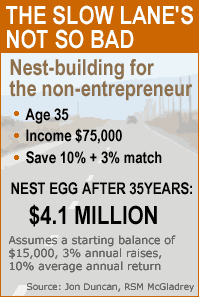
NEW YORK (CNN/Money) -
It's a little too easy to feel like a financial chump, isn't it?
We're bombarded with images of others' wealth, not to mention a slew of books and gurus telling us how to create our own.
The advice rarely changes: Start your own business. Invest in real estate. Buy franchises. Become a landlord.
| RELATED EVERYDAY MONEY COLUMNS
|

|
|
|
|
So, when was the last time you did any of these things?
Never? Me neither.
Of course, you tell yourself, you always could.
Well, sure, most of us could ... if we were completely different.
Such paths are for people whose natures are well-suited to the demands and risks of the job. But we're not all cut from the same cloth, no matter how easy the books make wealth-building sound.
What's more, being suited to a given business doesn't guarantee success. Many new ventures fail, and even when they succeed, they don't necessarily leave the owners trading quips with Michael Dell or even Ms. Area Mogul.
I know it won't get me any dollar-soaked book deals, but I'm trying to make my peace with being just a 401(k) kinda gal.
| IF YOU REALLY WANT TO START YOUR OWN BIZ ...
|

|
|
|
|
I enjoy not having to worry about meeting payroll or catering to fickle clients. And let's not even discuss my aversion to begging for funding and being eye-high in debt. So, bye-bye, new business.
And while owning a franchise seems like the lowest-risk model for entrepreneurship, I'm not sure I would be interested enough in a product or service – or the cookie-cutter approach you're expected to adopt -- to sell it successfully. Sayonara, 7-Elevens.
Nor do I relish the thought of managing the repair of others' toilets as a landlord. Bottom line: I prefer to lord over my own castle, not someone else's.
As for serious real estate investing, I'd be willing to give it a shot if I had more cash to spare. After all, someone's going to be on the hook for property taxes, insurance, upkeep and loan payments until that lovely lot starts sprouting money – a process that in too many unsung instances can take years, if it happens at all.
Next stop: Poorhouse?
So am I doomed to be net worthless? Do I lack the instinct to be rich?
Well, I certainly lack the instinct to be fabulously wealthy like a Donald Trump (or even one of those smarmy apprentices he keeps firing).
Wealthy entrepreneurs have "a personality and a mental framework that are very comfortable with taking risks, enormous risks," said certified financial planner Jon Duncan, a director of RSM McGladrey's Wealth Management Group.
"(Theirs) is a wealth-creation mentality," he said. "It's seeing a business or piece of property and having the vision to transform it into something worth more than you can pay for it."
And when funds run low, no wasteful hand-wringing allowed. "These guys don't worry about that," Duncan said. Indeed, many of the wealthy business owners he's worked with have gone through times when it seemed they would be anything but rich because a business fails or their debt multiplies.
As a model hand-wringer, I was glad to learn Duncan has plenty of clients with $1 million-plus in their retirement accounts, who got that way by saving, not by investing in real estate or running a business.
Dancing to a slower beat
A 401(k) can give you a good shot at being comfortable -- and building some serious net worth.
Duncan ran a few numbers to demonstrate. Take a 35-year-old with retirement savings of $15,000 and a household income of $75,000, increasing 3 percent a year. Let's say, he or she invests 13 percent of the family income (10 percent of salary plus employer matches) until age 70. (Hey, if demographic trends are right, we're going to be living longer and retiring later.)

And let's assume the portfolio generates annual average returns of 10 percent. By age 70, that nest egg will have grown to roughly $4.1 million (the equivalent of $1.4 million today).
That means if the 35-year-old starts collecting Social Security at age 70 and lives to 92, he or she can live on the equivalent of up to $110,000 pre-tax a year (in today's dollars) during retirement – that's $35,000 more than the current family income. (A portion of the income will come from Social Security, and the rest from the nest egg.)
If the portfolio returns just 8 percent a year, the nest egg would grow to $2.6 million (the equivalent of $900,000 today) and the family could still live on the equivalent of $75,000 annually.
Is that it?
All right, so it doesn't scream "filthy rich."
But think about it. Only 10 percent of income plus matches invested annually potentially can provide an income at age 70 that's the same as or greater than the 35-year-old's current household income. That's not a bad starting point for wealth-building if you're not a huge risk-taker.
And there's nothing saying a 35-year-old might not be able to save, say, 15 percent of family income at some point, or get a higher-paying job or own a house or cash-in stock options. All of which could have a substantially positive impact on net worth.
Being "just" a 401(k) person is certainly not risk-free. You could be fired, you could invest badly or a bear market could come at the wrong time.
But it still seems like less risk than putting everything on the line for a new business or real estate venture -- unless, of course, that's your dream.
Jeanne Sahadi writes about personal finance for CNN/Money. She also appears regularly on CNNfn's "Your Money," which airs weeknights at 5 p.m. ET. Please let her know what you think about this or other columns by e-mailing her at everydaymoney@cnnmoney.com.

|

